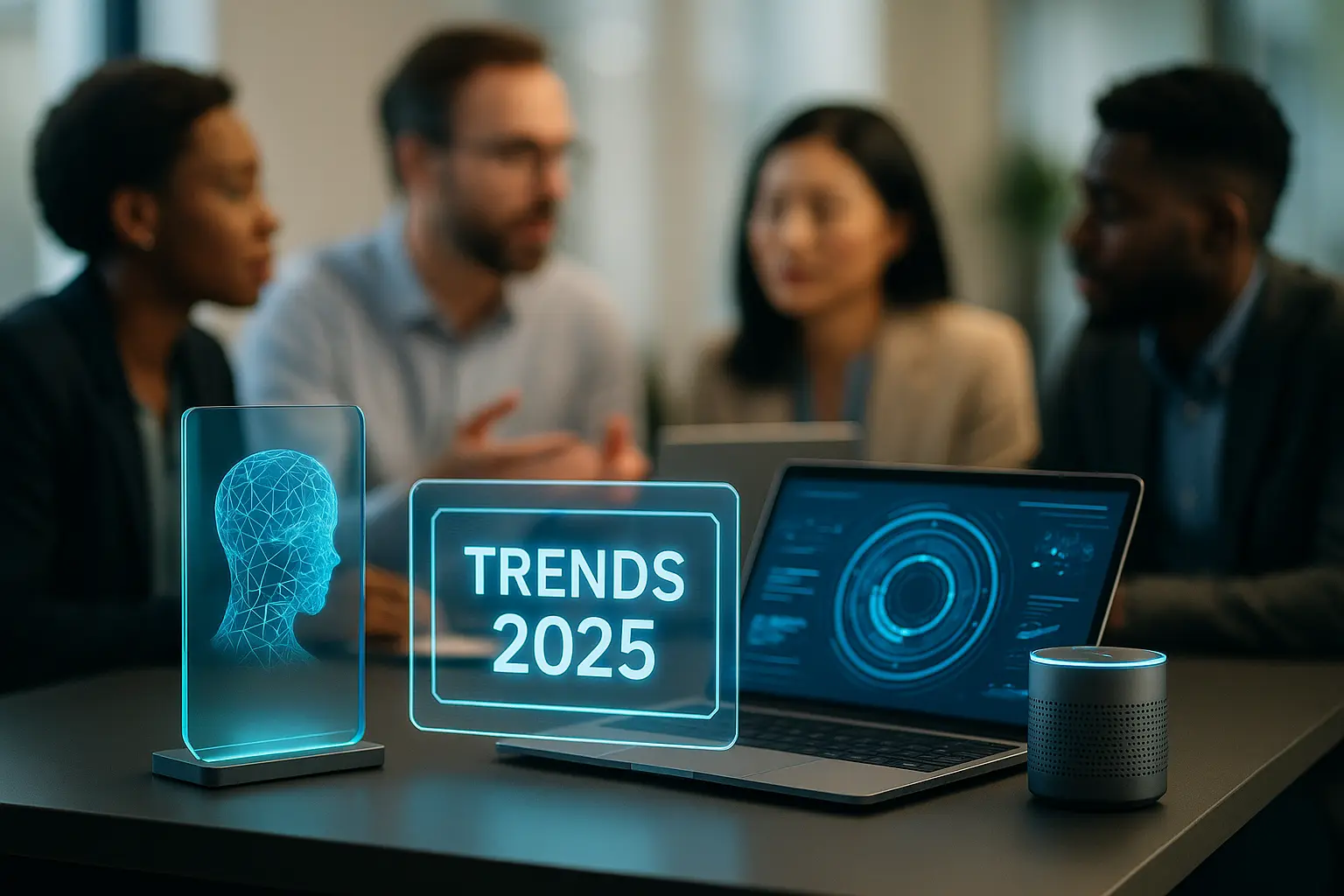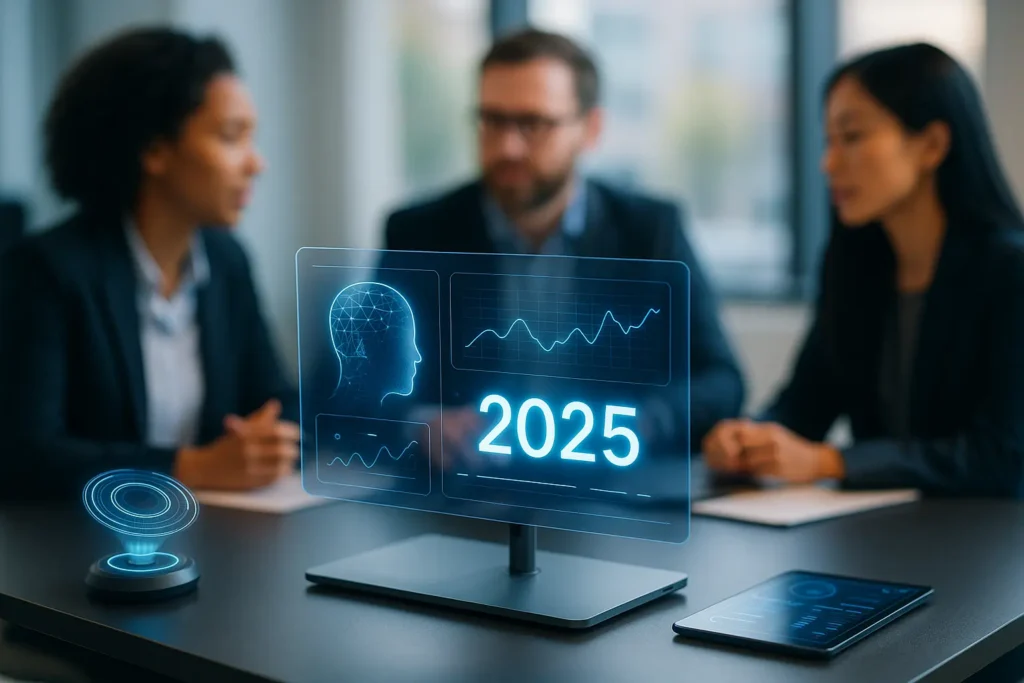In the ever-evolving realm of technology, the year 2025 has ushered in groundbreaking innovations that are reshaping the IT landscape. As companies worldwide adapt to these changes, we find ourselves at the epicenter of a digital revolution. Imagine a world where quantum computing and generative technologies are not just buzzwords but the driving forces behind industry transformation. In this article, we delve into the trends that are not only altering the way businesses operate but are also setting the stage for a new era of global connectivity and security. Let’s explore these trends from a human perspective, with insights that cater to both tech enthusiasts and professionals seeking to stay ahead in this dynamic world.
The Quantum Leap: Computing Beyond Imagination
Quantum computing has transitioned from theoretical musings to a tangible force disrupting the IT industry. As we navigate through 2025, the potential of quantum technology is becoming increasingly apparent, offering computational capabilities that were previously unfathomable.
Quantum supremacy, a term once reserved for scientific discussions, is now a reality as tech companies harness this power to solve complex problems in seconds rather than years. This shift is poised to revolutionize industries ranging from pharmaceuticals to financial services, providing solutions with unparalleled speed and accuracy.
But how does this affect us on a broader scale? Businesses are leveraging quantum computing for more than just enhanced computational power. It offers a new dimension in data analysis and security. By applying quantum algorithms, we can secure communication channels against cyber threats, a paramount concern in today’s digital age.
Moreover, quantum computing opens the door to new services and software applications previously considered unattainable. Imagine a world where logistics networks optimize themselves in real-time or where financial models adapt instantaneously to market changes. These advancements will redefine what it means to operate efficiently and securely in a global marketplace.
Generative AI: Crafting the Future of Creativity
In 2025, generative technologies have transcended beyond mere fascination, becoming integral to creative processes across multiple sectors. Generative AI, with its ability to produce content autonomously, is transforming the way we engage with digital mediums.
This technology isn’t just about creating art or music; it’s revolutionizing business operations. Companies are now using generative AI to design innovative product prototypes, personalize marketing strategies, and even generate intricate coding frameworks. The global reach of this technology means that firms can tailor their approaches based on regional preferences with unprecedented precision.
From a journalistic perspective, we’re witnessing a philosophical shift. Content that would take days to produce can now be generated in minutes, allowing us more time to focus on human-centric storytelling. This technology empowers us to view the world differently, encouraging creativity that is both original and data-driven.
Yet, as we marvel at these advancements, we must remain vigilant. The ethical implications of generative AI in content creation and beyond pose questions that we, as a society, must address. These trends urge us to adopt responsible practices while embracing the potential of this transformative technology.

The Cloud’s New Silver Lining: Enhancing Business Resilience
The cloud has long been a cornerstone of modern IT infrastructure, but in 2025, its role is being redefined. Cloud technologies are not only about storage and scalability; they’re about creating a more resilient and adaptive business environment.
The evolution of cloud services has led to the emergence of sophisticated multi-cloud strategies. Companies are no longer tied to a single vendor, offering improved security, flexibility, and cost management. This shift ensures businesses can adapt with agility to disruptions, a necessity in an era marked by global uncertainties.
Furthermore, the integration of cloud solutions with quantum and generative technologies is opening new horizons for innovation. This trio is enabling businesses to conduct operations at speeds and efficiencies previously unattainable.
We must also consider the environmental impact. As enterprises lean into cloud computing, data centers are becoming greener, minimizing carbon footprints while maximizing processing power. These actions resonate with an increasingly eco-conscious audience, highlighting the symbiotic relationship between technology and sustainability.
As we harness the evolving potential of the cloud, we’re not just building resilient systems; we’re forging a path toward a more sustainable, connected future.
Cybersecurity in the Digital Age: A New Paradigm
With the digital landscape expanding rapidly, cybersecurity has become a focal point in 2025. The stakes are higher than ever as businesses navigate a world fraught with cyber threats, necessitating updated security frameworks.
In this new era, security isn’t just about defense; it’s about proactive resilience. Companies are investing in cutting-edge technologies that prioritize threat detection and response, ensuring their infrastructures are robust against evolving cyber challenges.
Quantum computing plays a pivotal role in this landscape, offering encryption capabilities that outpace traditional methods. As hackers become more sophisticated, our defenses must evolve, and quantum technology is at the forefront of this transformation.
Beyond technology, we must also consider the human element. Training employees to recognize and respond to cyber threats is paramount. A culture of security awareness is essential, empowering individuals to act as the first line of defense in an interconnected world.
As we forge ahead, the balance between technological advancement and ethical responsibility remains critical. Our investments in cybersecurity must reflect not only our commitment to business integrity but also our dedication to safeguarding the interests of the global community.
In 2025, the IT sector is a crucible of change, driven by trends that challenge and inspire us. As we embrace the promise of quantum computing, generative technologies, and evolving cloud infrastructures, we must navigate this transformation with foresight and responsibility.
The path forward demands a blend of innovation and vigilance. By harnessing these technologies effectively, we can craft a future where businesses thrive in a secure, adaptive environment. Our role as stewards of progress involves not only leveraging these advancements but also ensuring they contribute meaningfully to our global society.
As we’ve explored, the intersection of technology and human ingenuity holds immense potential. It’s an era of opportunity, and how we shape it will define the legacy of companies, industries, and the world at large. Together, let’s build a digital landscape that is both transformative and equitable for generations to come.
FAQ
1. What are the key technologies expected to transform the IT sector by 2025?
The IT industry is poised for significant changes driven by innovations such as Artificial Intelligence (AI), Quantum Computing, 5G Networks, Blockchain, and the Internet of Things (IoT). Each of these technologies has the potential to revolutionize processes, enhance connectivity, and enable new business models.
2. How is AI expected to impact businesses in the near future?
AI is anticipated to enhance decision-making processes, automate routine tasks, and provide personalized user experiences. By integrating AI, businesses can improve operational efficiency, reduce costs, and offer more tailored products and services to meet customer needs.
3. Why is Quantum Computing considered a game-changer for the industry?
Quantum Computing is expected to revolutionize areas such as cryptography, optimization, and complex problem-solving. Its ability to process massive amounts of data at unprecedented speeds offers the potential for breakthroughs in scientific research, financial modeling, and logistics.
4. What role will 5G Networks play in shaping the future of connectivity?
5G Networks promise faster data transfer speeds, reduced latency, and increased capacity, allowing for seamless connectivity across devices. This technology will enable the growth of smart cities, enhance mobile experiences, and facilitate advancements in autonomous vehicles and remote healthcare services.
5. How is Blockchain technology anticipated to influence IT operations?
Blockchain offers a secure, decentralized method for recording transactions, which can enhance transparency and traceability in various industries. By reducing the risk of fraud and streamlining supply chain processes, Blockchain is set to transform sectors such as finance, healthcare, and logistics.



